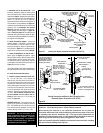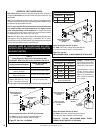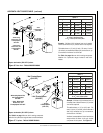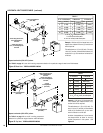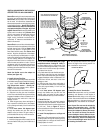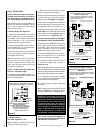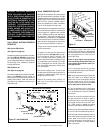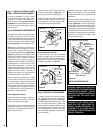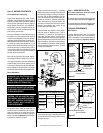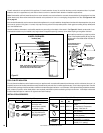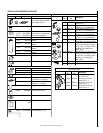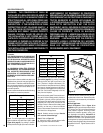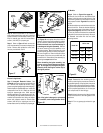
NOTE: DIAGRAMS & ILLUSTRATIONS NOT TO SCALE.
25
Combustible
Finished Wall
Materials
This Area Must Remain
Clear of Combustible
Materials
Top of Appliance
1" Min
(25 mm)
Spacer
Louver Face Models
Top of Door Frame
Combustible
material
may touch the
appliance top.
Hood must be installed as shown.
Louvers
Combustible
materials not
allowed below
this point on
the face of the
appliance.
Combustible
Finished Wall
Materials
This Area Must Remain
Clear of Combustible
Materials
Top of Appliance
1" Min
(25 mm)
Spacer
Clean Face Models
Top of Door Frame
Hood must be installed as shown.
Radiant panel
Combustible
material
may touch the
appliance top.
Combustible
materials not
allowed below
this point on
the face of the
appliance.
RENRUBNIAM
GNITTESGNINEPORETTUHSYROTCAF
sledoM
saGlarutaN
)mm(sehcni
saGenaporP
)mm(sehcni
0353VDE
8/1)2.3(
8/3)5.9(
5304VDE)5.9(8/3
0454VDE)5.9(8/3
Air Shutter
Opening
Burner
Venturi
Tube
Air
Shutter
Door
Orifice
Increase
Air Shutter
Opening
Decrease
Air Shutter
Opening
Air Shutter
Adjusting
Arm
Figure 50
Figure 51
Figure 52
Burner Adjustment
Leave the control knob in the ON position and
the remote switch OFF. Close the lower control
compartment door.
Step 10. BURNER ADJUSTMENTS
Flame Appearance and sooting
Proper flame appearance is a matter of taste.
Generally, most people prefer the warm glow of
a yellow to orange flame. Appliances operated
with air shutter openings that are too large will
exhibit flames that are blue and transparent.
These weak, blue and transparent flames are
termed anemic. If the air shutter opening is too
small sooting may develop.
Sooting is indicated by black puffs developing
at the tips of very long orange flames. Sooting
results in black deposits forming on the logs,
appliance inside surfaces and on exterior sur-
faces adjacent to the vent termination. Sooting
is caused by incomplete combustion in the
flames and lack of combustion air entering the
air shutter opening. To achieve a warm yellow
to orange flame with an orange body that does
not soot, the shutter opening must be adjusted
between these two extremes.
No smoke or soot should be present. Reposi-
tion the logs if flames impinge on any of them.
If the logs are properly positioned and sooting
conditions exist, the air shutter opening on the
main burner tube should be adjusted. Normally,
the more offsets in the vent system, the greater
the need for the air shutter to be opened further.
Observe the flame continuously. If it appears
weak or sooty as previously described, adjust the
air shutter by pushing or pulling on the adjust-
ment rod until the flame appearance is as de-
sired. The adjustment rod and associated ad-
justable air shutter is patented technology.
Flame adjustments can be made quickly and
accurately to taste without the need of disas-
sembling the appliance and waiting for 30
minutes after each adjustment.
Propane models may exhibit a flame pattern
that may candle or appear stringy. If this is
problematic or persists as the appliance is
continually operated, adjust the air shutter
closed as described in the previous paragraphs.
Operate the appliance for a period of time as the
effect diminishes, ensuring that the appliance
does not develop sooty flames. When satisfied
that the appliance operates properly, proceed
to finish the installation.
WARNING: AIR SHUTTER ADJUST-
MENT SHOULD ONLY BE PER-
FORMED BY A QUALIFIED PROFES-
SIONAL SERVICE TECHNICIAN.
IMPORTANT: ENSURE THAT THE FRONT
GLASS PANEL IS IN PLACE AND SEALED
DURING ADJUSTMENT.
CAUTION: THE AIR SHUTTER DOOR
AND NEARBY APPLIANCE SURFACES
ARE HOT. EXERCISE CAUTION TO
AVOID INJURY WHILE ADJUSTING
FLAME APPEARANCE.
FINISHING REQUIREMENTS
Wall Details
Complete finished interior wall. To install the
appliance facing flush with the finished wall,
position framework to accommodate the thick-
ness of the finished wall (
Figures 51 and 52
)
Step 11. HOOD INSTALLATION
All of these appliances must have hoods
installed prior to operating.
On all clean face units, slide the hood into the slots
on the lower edge of the radiant panel
(Figure 51 )
.
On louvered face units, slide the hood into the slots
on the lower edge of the cabinet top
(Figure 52 )
.
To adjust the flame, rotate the adjustment rod
toward the back or toward the front of the fire-
place (rod located in the lower control area).
Position the air shutter to the factory setting as
shown in the table in
Figure 50
. Allow the burner
to operate for at least 15 minutes.



